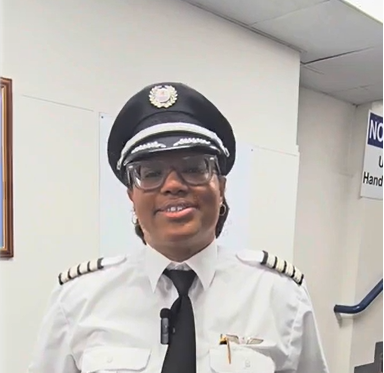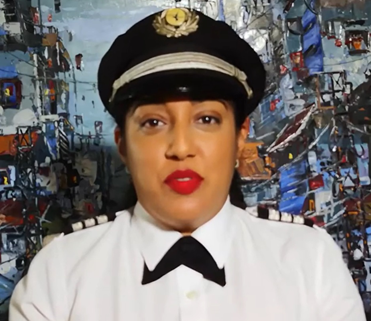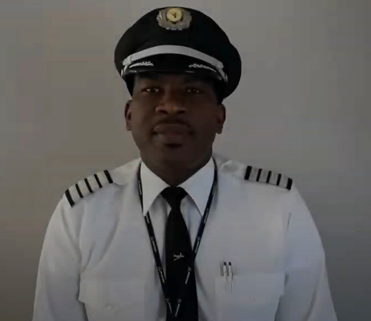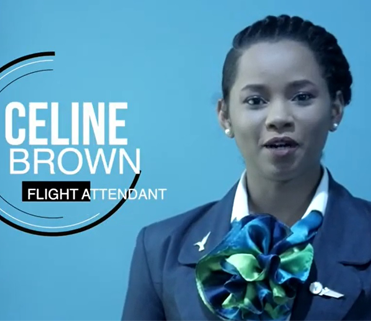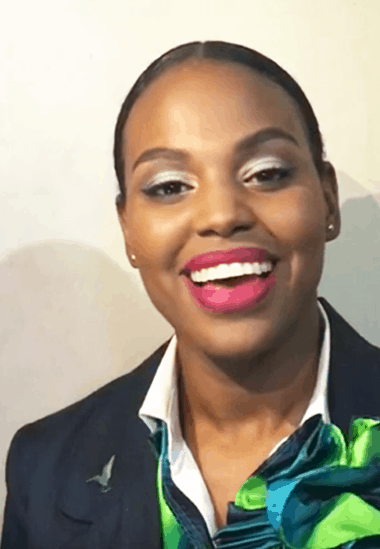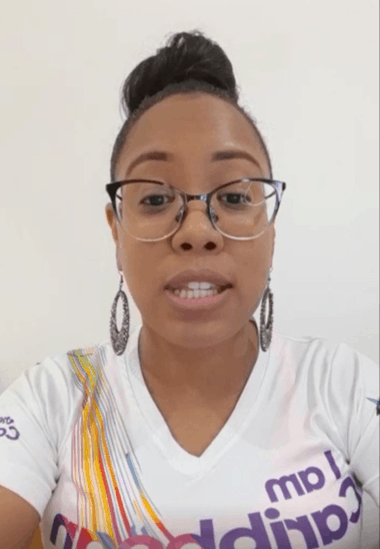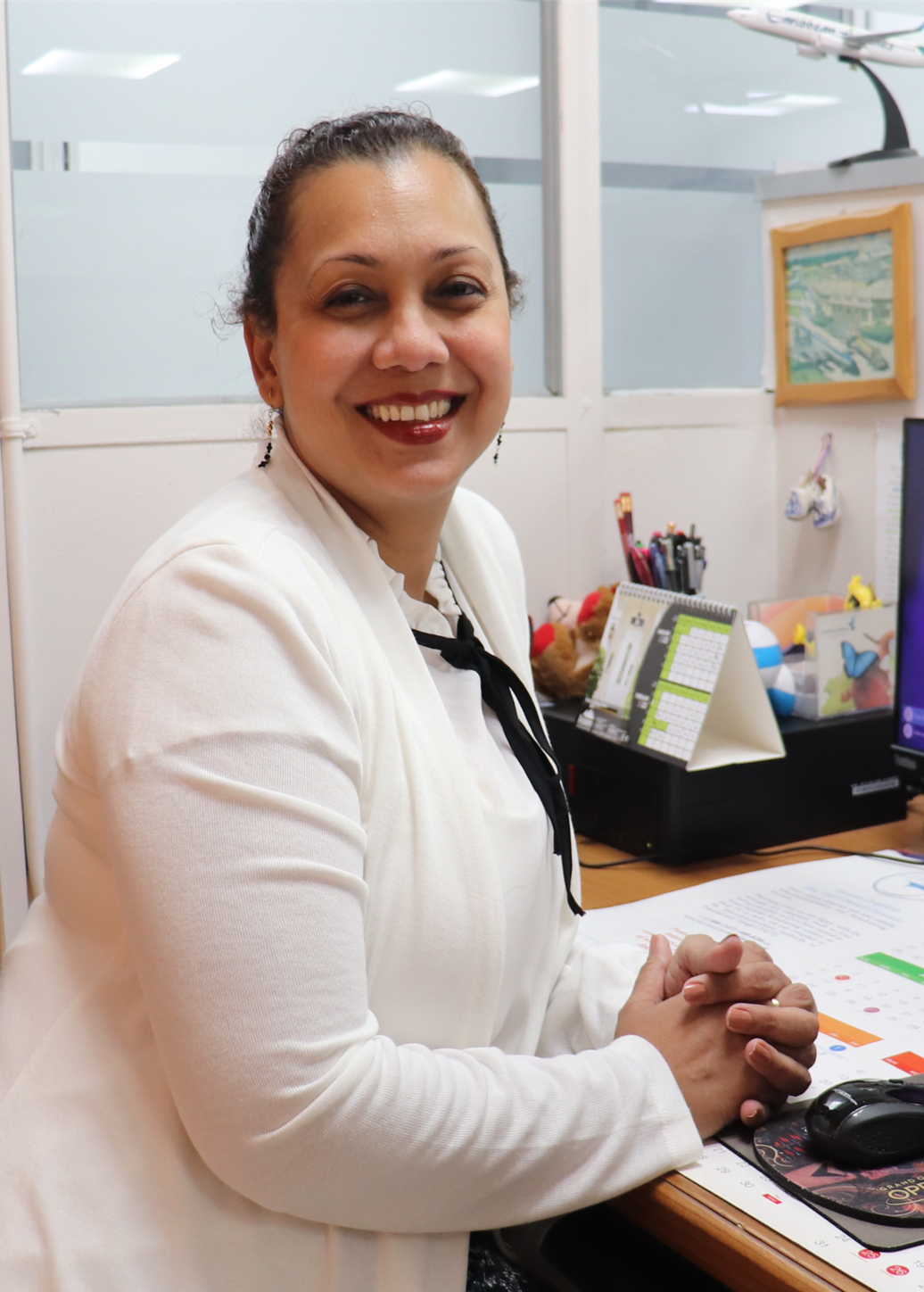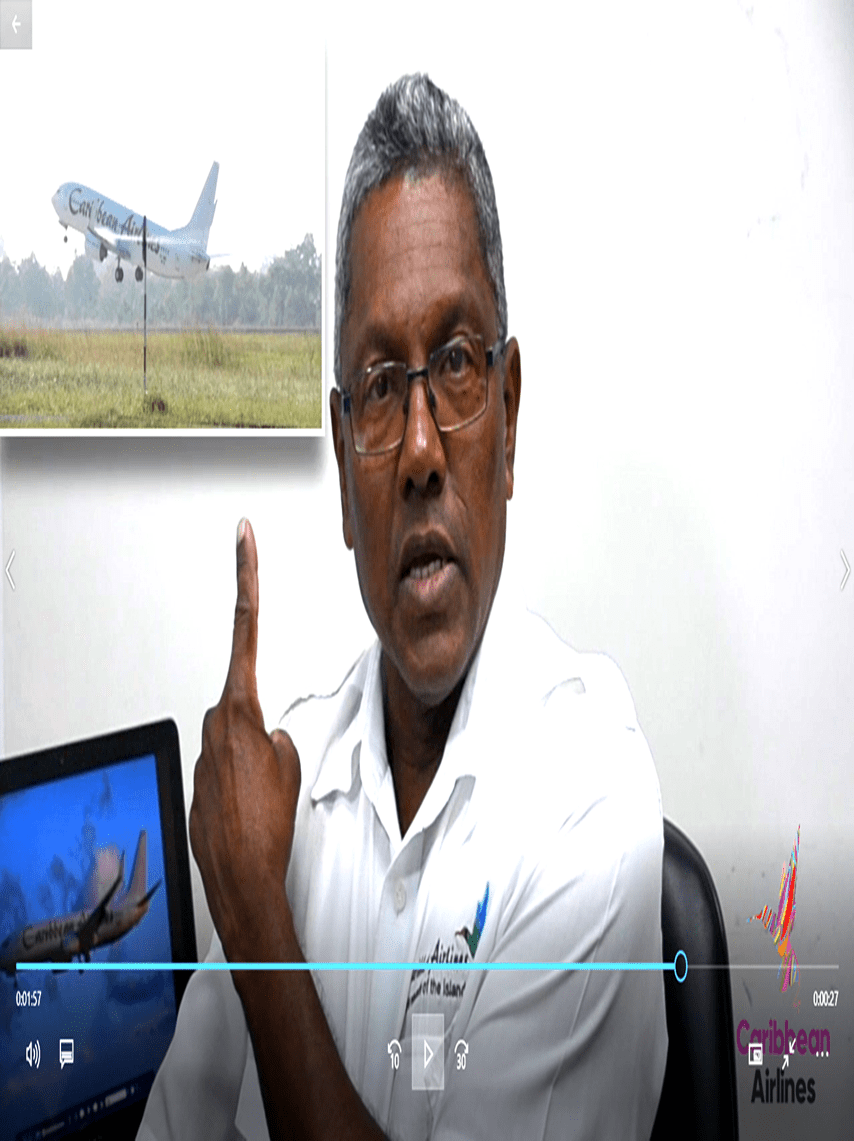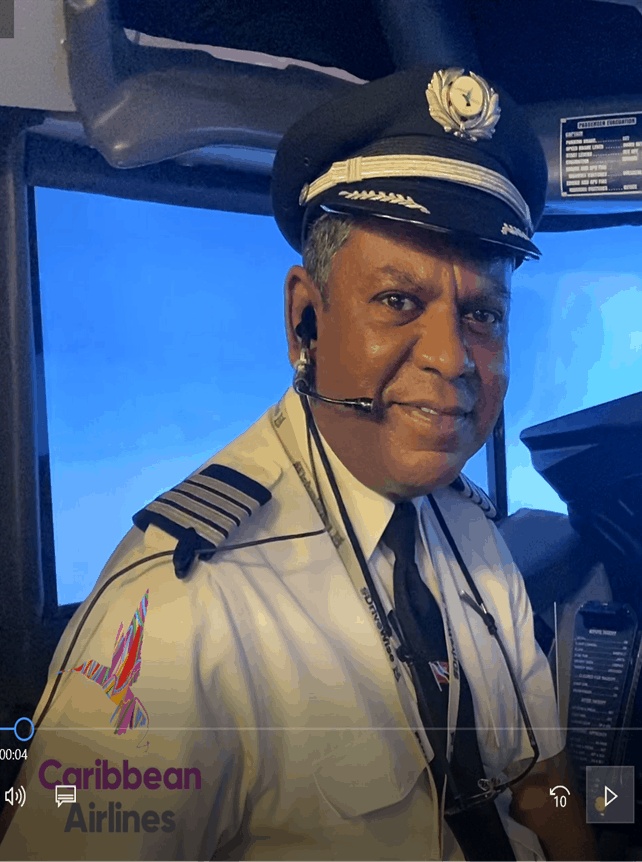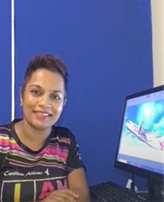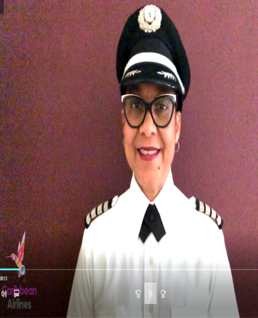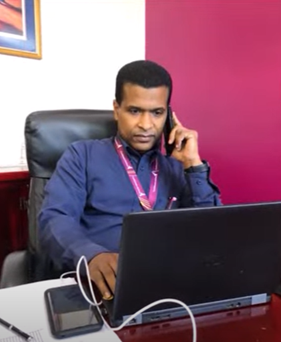Your future in Aviation begins here
If you are passionate, service-driven and love people, you’ll fit right into the Caribbean Airlines’ family.
Come soar with us!
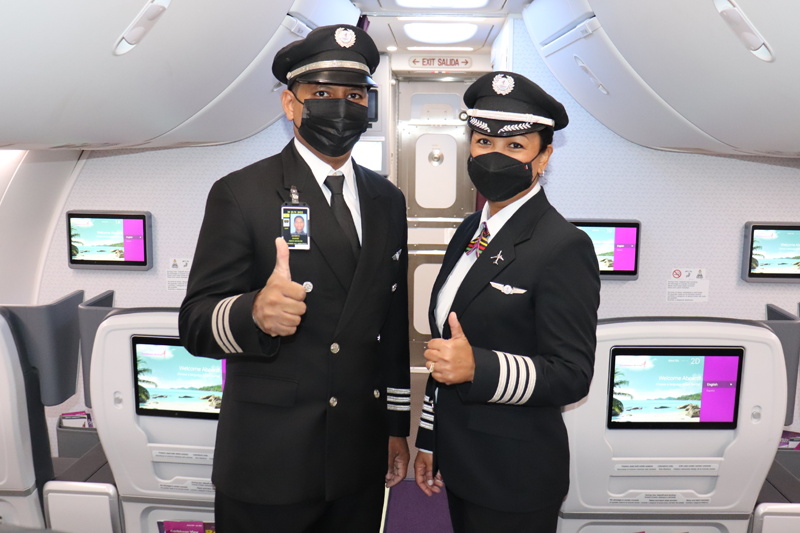
Top questions asked to First Officers (Pilots) employed with Caribbean Airlines
1. Question -What qualifications must I have in order to become a First Officer (Pilot) with Caribbean Airlines?
Answer: You will need to have a minimum of any five(5) Caribbean Secondary Education Certificate (CSEC) subjects, including Mathematics and English, which are mandatory. However, the more subjects you have, including diplomas or degrees will be an asset.
2. Question: What type of license do I need to operate as a pilot with Caribbean Airlines ?
Answer: To fly with Caribbean Airlines you must be the holder of a Trinidad & Tobago Commercial Pilot License with a Multi Engine Instrument Rating.
3. Question: What kind of training would I need to undergo in order to become a pilot with Caribbean Airlines and how long might that training period take?
Answer: In flight school, you will be required to complete your Private and Commercial license as well as your Multi Engine and Instrument Rating. The time frame depends on your discipline and focus but can normally be completed within 1-2 years.
Upon joining the Airline, you will undergo various types of training. It can take between 2-4 months to start flying.
4. Question: How are flight simulators used in training?
Answer: A Flight Simulator is used for your initial training and is a very integral component in the certification process which allows you to legally operate the aircraft. Simulators are also used for recurrent training which is completed every six months.
Simulators are an excellent tool for preparation and advanced training. Whilst allowing you to learn advanced procedures they are also excellent for building your confidence. Furthermore, flight simulators allow pilots to enhance their flying skills, judgment, and situational awareness, which contribute to the wider safety of flight operations and the air transport industry.
Question 5: How can I get in touch with a flight school?
Answer: Flight Schools can be found using the internet or by referral.
Aerial Services Limited and Briko Air Services are two well known flight schools that we can recommend. Their contact info is outlined below for easy reference.
1. Aerial Services
Website: https://aerialservicesltd.co
Contact numbers :344-5359/302-7487
Email: aerialservicesltd@gmail.com
Briko Air Services :
2. https://www.facebook.com/brikoairservices.
Contact:680-4657
Email:brikoair@hotmail.com
Question 6: If I have no money as a student, can I still accomplish my dream of becoming a pilot?
Answer: Just because you have no money now, it doesn’t mean that your dream will not materialize. Once you’ve graduated from high school/college you can consider getting a job and saving towards your goal of becoming a pilot.
You can even reach out to various financial institutions to find out if they can assist you in anyway, as you strive to accomplish your goal of becoming a pilot.
Follow your dream and remember anything is possible!

Top questions asked to Flight Attendants employed with Caribbean Airlines
1.Question: What qualifications must I have in order to become a flight attendant with Caribbean Airlines?
Answer: One will need to have any five Caribbean Secondary Education Certificate (CSEC) subjects, including Mathematics and English. (Having a degree is not mandatory but is considered an asset)
2.Question: Apart from having a full certificate of five ( 5) subjects, are there any other requirements to becoming a flight attendant with Caribbean Airlines?
Answer: Yes. You must also have:
• A swimming certificate from a recognised institution
• First Aid Training
• A Police Certificate of Good Character
• A valid passport
• Customer Service Experience.
3.Question: Does Caribbean Airlines provide any type of training for persons wanting to become a Flight Attendant, and how long does that training period take?
Answer: Once you’ve successfully gone through the recruitment process and is hired, Caribbean Airlines will provide you with training. This training can last up to 8 weeks minimum and covers a range of general aviation topics, as well as aircraft type specific training.
4.Question: Do I have to be a particular height and weight in order to function in this role?
Answer: Yes. You are required to be at least 5 feet 3 inches minimum (without shoes) and a maximum height of 6 feet 2 inches (with shoes) with weight proportionate to height.
5. Question: At what age can I apply to be a Flight Attendant with Caribbean Airlines?
Answer: You can apply from 18 years old.
6. Question: Do I have to be fluent in any language in order to get a job as a Flight Attendant with Caribbean Airlines?
Answer: Yes. You must be fluent in speaking English, however, being proficient in a second language (example Spanish) is an asset also.
Career Insight from Caribbean Airlines' Staff
Captain Arian Blanchard: Career Talk 3:08
Captain Blanchard, our company’s first Female Check Airman shares her experiences in the aviation industry both as a woman, and within Caribbean Airlines along with how she came to attain the qualification of Check Airman in this video.
First Officer Aleena Ali : Career Talk 3:08
Caribbean Airlines’ First Officer Aleena Ali answers the question: “Do Pilots Get Scared?” and more in this video
Captain Brenton Borrows: Career Talk 2:15
Caribbean Airlines’ Pilot based in Kingston Jamaica, shares why he loves his job and advises on how to kick-start your career as a pilot.
Cabin Attendant Celine Brown : Career Talk 2:49
Caribbean Airlines’ Flight Attendant Celine Brown shares the pros and cons of being a Flight Attendant and more in this video
Flight Attendant Chandelle Samlal: Career Talk 2:25
Stay Positive, Smile and Be safe …words of advice from Caribbean Airlines FA Chandelle Samlal and more in this video.
Reservation Agent : Career Talk 4:17
Reservation Agent Elisha Miller explains what her job is all about
Customer Experience Officer : Career Talk 2:10
What does it take to be a Customer Experience Officer at Caribbean Airlines? Find out from Aneesa Mohammed, who has more than a decade of experience working in Caribbean Airlines’ Customer Experience Department.
Avionics Engineer Derek Felix: Career Talk 2:24
With some 30 years of experience in the aviation industry Derek Felix still has a passion for what he does. Watch the video to hear him share about his job function.
Caribbean Airlines Captain Rodney Ragbir : Career Talk 3:39
Captain Rodney Ragbir has had over 20 years of experience in the aviation industry and still enjoys what he does.
Caribbean Airlines’ Cargo Marketing Officer: Career Talk 2:11
Kaleia Christie, Caribbean Airlines’ cargo marketing officer, shares some interesting details about her job. View video to see more.
Caribbean Airlines Crew Control Officer Lisha Balkaran: Career Talk 2:07
Ever wondered who’s responsible for effectively managing the work rosters for our inflight crews? View Video to find out more…
Caribbean Airlines’ Captain Lisa Elliot: Career Talk 3:01
Caribbean Airlines’ Captain Lisa Elliot, based in Jamaica, explains the steps one must take in order to become a pilot and more in this video.
Caribbean Airlines’ Security Department: Career Talk 5:52
Caribbean Airlines’ Security has the important job of keeping our customers, staff and the company safe. View video to find out more…

